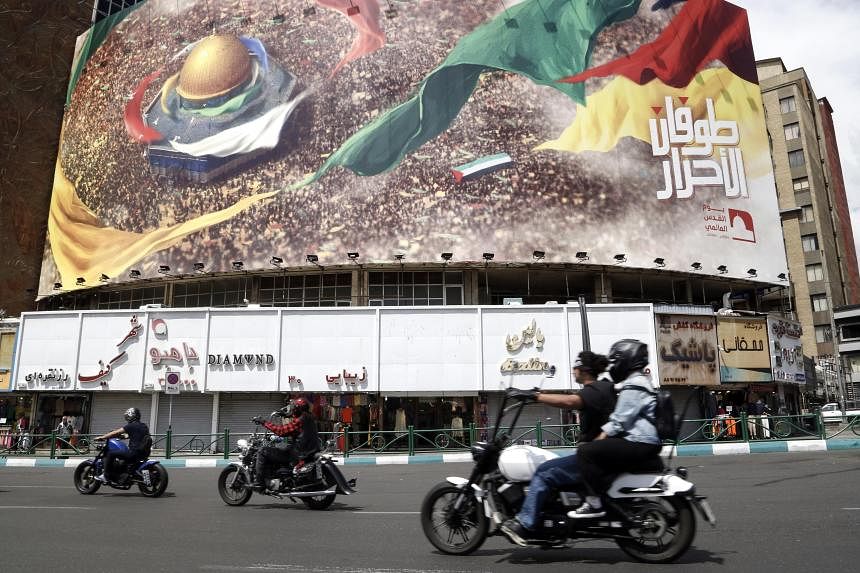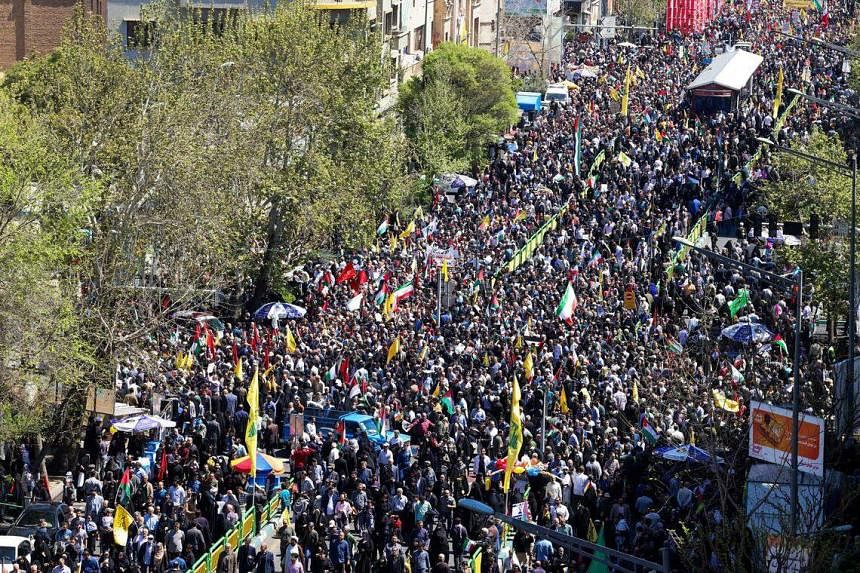
The US and its European allies fear that an April 1 attack in Syria that killed several Iranian officers could push Israel and Iran to the verge of something they have avoided for decades: Open war.
Until now, Iran, with one exception, has used proxies to attack Israel, while Israel has avoided airstrikes on Iranian soil.
Now Israel is bracing itself for retaliation for the strike in Damascus, a prospect provoking fears of a regional conflict.
How might a war between them be fought?
At this point, the two likeliest scenarios appear to be a missile barrage into Israeli territory, either from proxies in Lebanon, from Iran itself, or a swarming drone assault.
A more remote possibility is that Iran could also direct proxies to deploy militants on the ground from Syria or Lebanon.
The one precedent for Iran attacking Israeli territory came in 2018, when Teheran fired rockets from Syria on positions in the Golan Heights.
The details of Iran’s current capabilities contained in a United States Defence Intelligence Agency (DIA) assessment released with little fanfare on April 11 suggested that any Iranian attack on Israel would likely be a combination of missiles and unmanned aerial vehicles (UAV), or drones.
“Teheran’s missile force is increasingly augmented by Iran’s UAVs and serves as the regime’s primary conventional deterrent against attacks on its personnel and territory,” the agency said.
It added that Iran has a “substantial inventory” of ballistic and cruise missiles capable of striking targets 2,000km away – putting Israel well within range.
Israeli fighters would be expected to strike back, including those in its fleet of stealthy F-35I Adir and non-stealthy F-15I fighters. An F-35 made aviation history when the Israeli Air Force announced in November that it had shot down a cruise missile from the south-east headed towards Israeli airspace.
Israel scrambled navigational signals over the Tel Aviv metropolitan area early this month in preparation for an Iranian attack, a showcase of its capabilities.
Another likelihood is cyber war. More than a decade ago, malware known as Stuxnet compromised operations at an Iranian nuclear enrichment facility in what was suspected to have been a United States and Israeli operation.
Iran has also launched attacks of its own, including a hack that sought to cripple computers and water flow for two Israeli districts, according to the Council on Foreign Relations.
How do Israeli and Iranian military capabilities compare?
Israel’s forces are vastly superior to Iran’s when it comes to technology. Iran, however, has massive stockpiles of cheap but effective weapons in its arsenal.
Since 2022, Iran has provided more than 1,000 Shahed-136 UAVs, as well as Shahed-131 and Mohajer-6 UAVs, to support Russia’s invasion of Ukraine.
In May, Iran began assisting Russia in establishing a Shahed-136 UAV production facility in Russia, according to the DIA. So it is safe to assume that Iran has hundreds if not thousands of one-way drones in its inventory to attack Israel.
Israel would counter ballistic missiles with its Arrow interceptors and drone attacks possibly with David’s Sling air defence systems and perhaps with a system called Drone Guard made by ELTA Systems.

Who are their allies? What roles might they play?
Iran’s most important allies are the Shi’ite militias in Lebanon, Iraq, Syria and Yemen that it supports with money, weapons and training.
The Lebanese militia Hezbollah would be positioned to play the most significant role.
It has fought repeated battles with Israel and has been regularly firing missiles, mortars and rockets into northern Israel since war broke out in October between Israel and the Iran-backed militant Palestinian group Hamas.
Hezbollah’s arsenal contains more than 70,000 rockets and missiles, including long-range and precision-guided missiles, according to Israeli intelligence.
An escalation of its attacks on Israel could test the country’s defences at a time when it was also confronting Iran and Hamas.
Iran’s only state ally in the Middle East is Syria. The government of President Bashar al-Assad would be unlikely to be of assistance, given that it is still struggling to gain control over the entire country following the outbreak of civil war in 2011.
Iran has good relations with Russia, though its war in Ukraine would likely limit its ability to help, and with China, which has bought Iranian oil though it remains sanctioned by the US and allies.
Israel has the US on its side. Already the US is expediting shipments of munitions to Israel, to help it fight Hamas. Among the US forces in the Middle East region are two Navy destroyers that moved to the eastern Mediterranean in early April, according to a Navy official: the USS Carney and the USS Arleigh Burke, both capable of air defense.
Early in the Israel-Hamas war, the Pentagon moved its newest aircraft carrier, the Gerald R. Ford, and its battle group into the eastern Mediterranean. It has since returned home.
The Dwight D. Eisenhower carrier strike group is on its way from operations against the Houthis. Each bristles with F/A-18E/F Super Hornet fighter jets and other advanced aircraft.
In addition, 2,000 Marines were put on heightened alert for potential mobilisation.
How might Arab states react?
An Israel-Iran war would put many of the countries in the region in a difficult position.
Four Arab countries made peace deals with Israel in 2020 via the so-called Abraham Accords. Their distrust of Iran was part of what brought them together.
But it is unlikely any Arab state would stand with Israel in a confrontation against a fellow Muslim country, let alone one as powerful as Iran.
Iran and Saudi Arabia last year restored diplomatic relations after a seven-year freeze. Saudi Arabia has been exploring the possibility of normalising ties with Israel as part of a broader deal in which it hopes to attain US security guarantees, and it would likely try to avoid become embroiled in the conflict. BLOOMBERG
https://news.google.com/rss/articles/CBMiamh0dHBzOi8vd3d3LnN0cmFpdHN0aW1lcy5jb20vd29ybGQvbWlkZGxlLWVhc3QvaXNyYWVsLXYtaXJhbi13aGF0LWFuLW9wZW4td2FyLWJldHdlZW4tdGhlbS1jb3VsZC1sb29rLWxpa2XSAQA?oc=5
2024-04-13 09:38:00Z
CBMiamh0dHBzOi8vd3d3LnN0cmFpdHN0aW1lcy5jb20vd29ybGQvbWlkZGxlLWVhc3QvaXNyYWVsLXYtaXJhbi13aGF0LWFuLW9wZW4td2FyLWJldHdlZW4tdGhlbS1jb3VsZC1sb29rLWxpa2XSAQA
Tidak ada komentar:
Posting Komentar